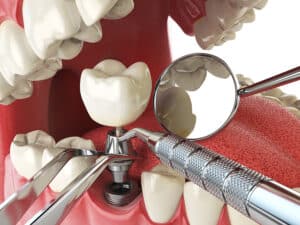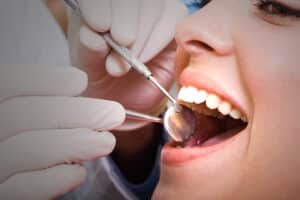Facial aesthetics has a big impact on how we see ourselves and how others see us. But beyond how we look on the outside, our oral health has a big impact on our general health. People usually think of oral surgery as an area that deals with dental problems, but it is becoming more and more known for its ability to completely enhance facial aesthetics. Can oral surgeries like dental implants improve how a person looks and feels?
Understanding Oral Surgery
Oral surgery is a specialized branch of dentistry that deals with surgical procedures involving the oral cavity and related structures. It goes beyond routine dental treatments, focusing on addressing complex issues and enhancing oral health.
One common oral surgery procedure is the extraction of wisdom teeth, which is often necessary due to their potential to cause pain and complications. Additionally, oral surgeons perform intricate procedures like jaw surgery, aimed at correcting misalignments that may affect oral function and overall well-being. Dental implants, another facet of oral surgery, involve the surgical placement of artificial tooth roots to provide a permanent solution for missing teeth.
In essence, oral surgery encompasses a range of surgical interventions designed to address specific oral health concerns, ensuring the optimal functioning and well-being of the oral cavity.
Impact on Facial Aesthetics
While oral surgery is primarily associated with addressing oral health concerns, its impact often extends beyond the confines of the mouth, significantly influencing facial aesthetics. Understanding this connection reveals the transformative potential that oral surgery holds for enhancing the overall appearance of an individual.
Improved Symmetry and Balance
- Correction of Jaw Misalignment: Oral surgeries, such as orthognathic surgery, are instrumental in rectifying jaw misalignments. This not only contributes to improved oral function but also enhances facial symmetry.
- Alignment of Teeth: Procedures like orthognathic surgery can bring about the alignment of teeth, contributing to a more balanced and aesthetically pleasing smile.
Enhancement of Facial Features
- Improved Chin Projection: Certain oral surgeries, particularly those addressing jaw concerns, can positively impact chin projection, creating a more defined and balanced facial profile.
- Balanced Lip and Smile Aesthetics: The correction of oral issues through surgery often leads to a harmonious balance in lip and smile aesthetics, further enhancing facial attractiveness.
Boosting Confidence Through Oral Surgery
The impact of oral surgery on facial aesthetics is not merely cosmetic; it plays a profound role in boosting an individual’s confidence. Understanding the psychological aspects of these enhancements sheds light on how oral surgery extends beyond physical changes to positively influence self-esteem.
Psychological Impact of Facial Aesthetics on Self-Esteem
- Self-Perception: A harmonious and aesthetically pleasing facial appearance directly contributes to a positive self-perception. Oral surgeries that enhance facial features often lead to increased self-esteem and confidence.
- Social Confidence: Individuals who undergo oral surgery to improve their facial aesthetics commonly report a heightened sense of confidence in social situations. A confident smile can make a significant impact on interpersonal interactions.
Exploring the Link Between Oral Health and Overall Well-Being
- Holistic Well-Being: Beyond the aesthetic improvements, oral surgery contributes to overall well-being by addressing underlying oral health issues. A healthy mouth is linked to improved systemic health, reinforcing the interconnected nature of physical and mental well-being.
- Long-Term Confidence: Unlike temporary aesthetic solutions, oral surgeries offer lasting improvements. Knowing that the enhancements are not just superficial but contribute to long-term oral health fosters a sustained sense of confidence.
Dental Implants and Other Oral Surgery Procedures
Oral surgery encompasses a diverse array of procedures, each designed to address specific oral health concerns. Understanding the breadth of these interventions provides insight into the comprehensive nature of oral surgery.
- Wisdom Teeth Removal: The extraction of third molars, commonly known as wisdom teeth, is a routine oral surgery procedure to alleviate pain, prevent crowding, and maintain overall oral health.
- Jaw Surgery (Orthognathic Surgery): Orthognathic surgery is performed to address severe jaw misalignments, improving oral function, and often enhancing facial symmetry.
- Dental Implants: By surgically placing artificial tooth roots, dental implants offer a durable and natural-looking solution for missing teeth, contributing to both oral function and aesthetics.
- Corrective Jaw Surgery: Beyond misalignments, corrective jaw surgery can enhance facial symmetry, correct bite issues, and contribute to a more balanced facial appearance.
- Facial Trauma Surgery: Oral surgeons address facial trauma, repairing injuries to the face and jaw to restore both aesthetic and functional aspects.
- Cleft Lip and Palate Repair: Surgical interventions to repair cleft lip and palate conditions, addressing both functional and aesthetic aspects.
- TMJ (Temporomandibular Joint) Surgery: Surgical procedures to address disorders of the jaw joint, aiming to improve both oral function and alleviate associated pain.
- Periodontal Surgery: Surgical interventions to address advanced gum disease and restore gum health.
- Sinus Lift Surgery: Elevating the sinus floor to create space for dental implants in the upper jaw.
The Procedure: What to Expect
Preoperative Preparations
- Initial Consultation: The journey begins with a thorough consultation, where the oral surgeon assesses the patient’s oral health, discusses the desired outcomes, and formulates a personalized treatment plan.
- Diagnostic Imaging: Advanced diagnostic tools such as X-rays or 3D imaging may be utilized to get a detailed view of the oral structures, aiding in precise treatment planning.
Step-by-Step Breakdown of the Surgery
- Anesthesia Administration: Depending on the complexity of the procedure, local or general anesthesia may be administered to ensure patient comfort throughout the surgery.
- Incision and Procedure Specifics: The oral surgeon performs the necessary incisions and procedures based on the predetermined treatment plan. This could involve extraction, realignment, or implantation, depending on the nature of the surgery.
- Closure and Postoperative Care: After completing the surgical steps, the incisions are carefully closed, and specific postoperative care instructions are provided to facilitate a smooth recovery.
Postoperative Care and Recovery Timeline
- Immediate Postoperative Period: Details about what patients can expect immediately after the surgery, including potential discomfort, swelling, and any immediate restrictions on activities.
- Longer-Term Recovery: A breakdown of the recovery timeline, including follow-up appointments, dietary restrictions, and steps to promote optimal healing.
Choosing the Right Oral Surgeon
Selecting the right oral surgeon is crucial for a successful and positive oral surgery experience. Consider the following factors when making your decision:
- Educational Background: Ensure the oral surgeon has relevant degrees and training from reputable institutions, aligning with the complexity of your planned procedure.
- Patient Testimonials: Seek feedback from individuals who have undergone procedures with the oral surgeon. Their experiences provide insights into patient satisfaction and the overall treatment process.
- Online Reviews: Check online platforms for reviews, considering both positive and constructive feedback. Consistent positive reviews indicate a reliable and reputable oral surgeon.
- Communication Skills: Assess the oral surgeon’s ability to communicate clearly and empathetically. Effective communication ensures you feel comfortable discussing concerns and expressing expectations.
- Clear Treatment Plan: Look for a transparent and detailed treatment plan. This should cover the proposed procedure, expected outcomes, potential risks, and postoperative care instructions. Clarity in the treatment plan fosters trust and understanding.
By prioritizing these factors, you can confidently choose an oral surgeon who meets high professional standards, has a positive track record, and communicates effectively. A well-chosen oral surgeon plays a pivotal role in ensuring a smooth and successful oral surgery journey.
Experience Excellence in Oral Surgery with Dr. Greenberg
Trust your oral surgery needs to a specialist who combines expertise with compassion. Dr. Andrew Greenberg, your dedicated oral surgeon Mt Kisco and Westchester County, NY, brings years of experience in dental implants, teeth extraction, decayed teeth removal, bone grafting, and biopsies. You can expect:
- Expertise You Can Rely On: With a specialization in oral and maxillofacial surgery, Dr. Greenberg ensures comprehensive and effective pain relief tailored to your needs.
- Compassionate Care: Our approach goes beyond procedures; we prioritize your comfort and understanding throughout your oral surgery experience.
- Convenient Location: Visit our office in Briarcliff Manor today for a personalized consultation and discover how Dr. Greenberg can enhance your oral health and overall well-being.
Empower yourself with the expertise of Dr. Greenberg for a seamless and confident oral surgery journey. Your smile deserves the best. Schedule your consultation now!



